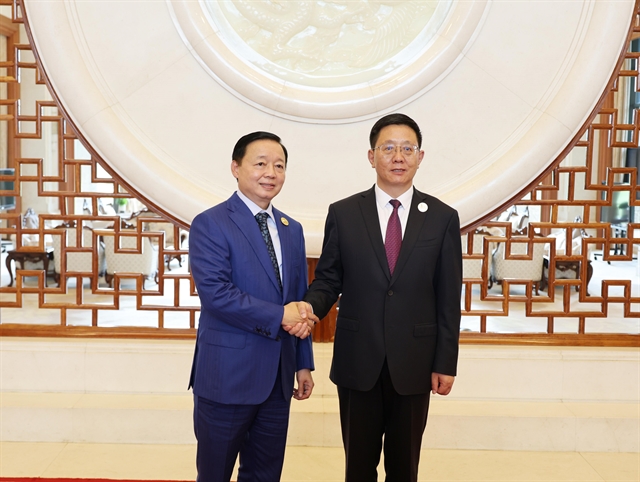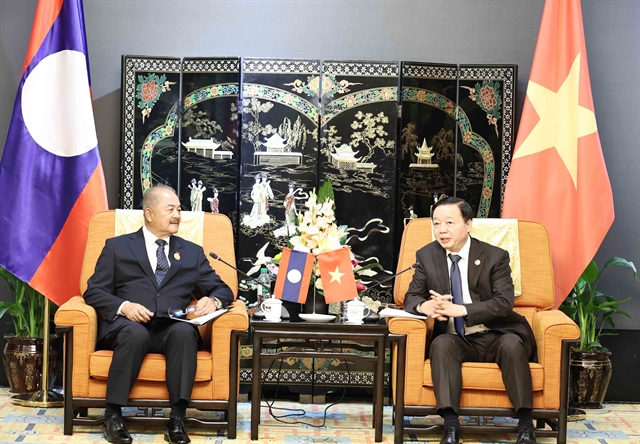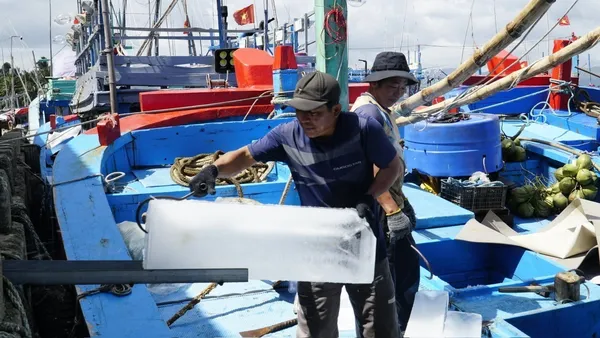 Politics & Law
Politics & Law


|
| Deputy Prime Minister Trần Hồng Hà (left) at the meeting with Governor of Yunnan Province Wang Yubo on June 19. — VNA/VNS Photo |
YUNNAN — The Vietnamese Government always facilitates Vietnamese localities’ efforts to further strengthen their friendship and cooperation with China’s Yunnan Province, Deputy Prime Minister Trần Hồng Hà told Governor of Yunnan Province Wang Yubo.
At his recent meeting in Yunnan with Wang, as part of his working trip to attend the opening of the 9th China - South Asia Expo and the 29th Kunming Import and Export Fair, Hà reiterated Việt Nam's consistent policy of valuing and giving top priority to fostering the friendly neighborliness and comprehensive cooperation with China.
Both officials expressed their satisfaction with the upward trajectory of Việt Nam–China ties, noting that two-way trade between Vietnamese localities and Yunnan surged 17.8 per cent in 2024 to US$3.13 billion, delivering tangible economic benefits.
Looking ahead, Hà urged Yunnan to continue to take the lead in translating high-level common perceptions into concrete actions, and enhance exchanges and cooperation with Vietnamese provinces. He called for stronger implementation of existing cooperation frameworks, including the annual Conference of Party Secretaries, Joint Working Group meetings between Yunnan and Việt Nam's Lào Cai, Hà Giang, Điện Biên, and Lai Châu provinces, and the Kunming–Lào Cai–Hà Nội–Hải Phòng–Quảng Ninh Economic Corridor Conference.
He proposed bolstering railway connectivity, particularly the Lào Cai–Hà Nội–Hải Phòng line, and expanding cooperation in commercial aviation and inland waterways. He set a goal of increasing Việt Nam–Yunnan trade to $5 billion, with a priority to balanced and sustainable growth. He also advocated for mutual recognition of testing and quarantine standards, enhanced power grid connectivity, and upgraded border infrastructure to improve cross-border transport.
In education and training, he called on Yunnan to offer more scholarships to Vietnamese students, particularly in sci-tech, transport, and railway sectors.
The Deputy PM urged both sides to strengthen land border management, expedite the opening and upgrading of certain border gates, and build a peaceful, stable boundary. He encouraged deeper cooperation under the Mekong–Lancang framework for sustainable development, focusing on sharing experience in river basin management, environmental protection, hydrological data, and tropical monsoon data.
Wang, for his part, said Yunnan attaches importance to its friendly cooperative ties with Việt Nam and stands ready to work closely with Vietnamese localities to effectively realise the common perceptions reached by the top leaders of both countries, particularly following recent reciprocal visits by Party General Secretary and President of China Xi Jinping and Vietnamese Party General Secretary Tô Lâm.
Agreeing with the proposals put forward by Hà, Wang affirmed that the province would actively coordinate with Vietnamese ministries, agencies, and localities to boost exchanges at all levels, maximise the effectiveness of existing cooperation mechanisms, and promote connectivity in key areas. These include power grid connectivity, strategic infrastructure linkage, especially the early completion of the Lào Cai–Hà Nội–Hải Phòng railway and its connection at Lào Cai–Hekou station, as well as the expansion of agricultural and agri-trade cooperation.
He highlighted the importance of strengthening cross-border crime prevention, particularly in combating drug trafficking and online fraud, while encouraging stronger people-to-people exchanges to further solidify the comprehensive strategic cooperative partnership and the China–Việt Nam Community with a shared future.

|
| Deputy Prime Minister Trần Hồng Hà (right) and Lao counterpart Kikeo Khaykhamphithoune at their meeting in Yunnan, China, on June 19. — VNA/VNS Photo |
At a meeting with his Lao counterpart Kikeo Khaykhamphithoune, Hà affirmed that the Vietnamese Party and State consistently give the highest priority to the special and rare solidarity with Laos while strongly and comprehensively supporting the latter's reform and development efforts.
For his part, the Lao Deputy PM stressed that his country attaches special importance to its relationship with Vietnam and remains committed to contributing to the sustainable development of their great friendship, special solidarity, and comprehensive cooperation.
The two officials commended the active coordination between ministries, sectors, and localities of both countries in addressing challenges, with several key cooperation projects making positive progress.
They agreed to continue instructing relevant agencies and localities to effectively implement the high-level agreements and cooperation programmes between the two Parties and countries, along with bilateral mechanisms. Emphasis will be placed on enhancing economic connectivity, particularly in transport infrastructure, they noted.
Both sides also concurred in further promoting public awareness and education, especially among younger generations, about the Việt Nam–Laos special ties.
In light of the increasingly complex and unpredictable global and regional landscapes, the two Deputy PMs agreed that the countries will maintain close coordination and mutual support at regional and international forums, and regularly consult with each other on strategic issues related to their security and development.
During a separate meeting with Gan Lin, Chairman of the Board of Directors of energy company Lancang-Mekong International (LMI), and Chen Zhong, deputy general director of China Communications Construction Co. Ltd (CCCC), Deputy PM Hà said enhancing infrastructure connectivity in transport, energy, and telecommunications will help unlock and optimise the potential and strengths of localities in both Việt Nam and China. Such efforts will contribute significantly to bilateral economic, trade, and investment cooperation, he added.
He stated the Vietnamese Government welcomes enterprises with effective investment policies, technologies, and projects in green energy sectors such as wind power, solar power, and pumped-storage hydropower, as well as in road, railway, aviation, and seaport infrastructure to the country.
The Chinese businesses expressed their keen interest in participating in high-speed railway and urban rail projects in Việt Nam. — VNA/VNS




